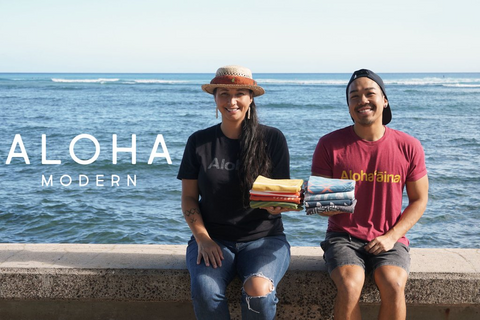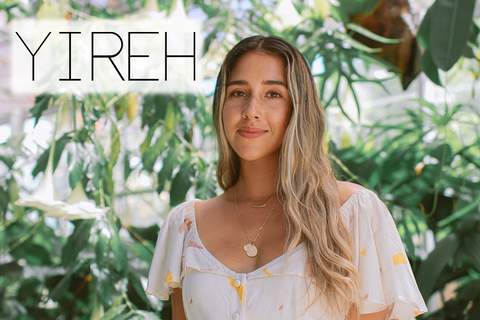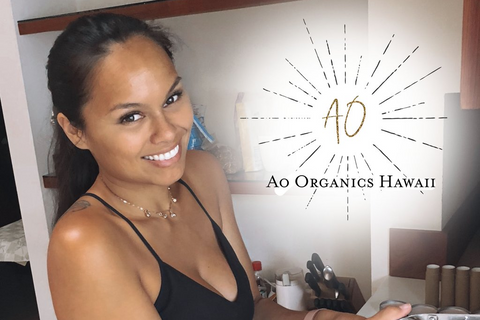
It was a winning combination of creative conversations during pau hana, ingenuity, and a desire to honor the culture of Hawaiʻi that Aloha Modern came to be.
The designs of Aloha Modern's products from their beach towels to bedsheets are inspired by the stars, ocean, and landscapes, as seen from an island-rooted perspective. Through their brand, the founders Mālia Kaʻaihue and Reyn Mukawa offer products that can be used casually in daily life that have the heart of an heirloom. Their prints authentically share the islands' stories, honor the past, and offer a genuine product for the generations to come.
"The intent was always to tell stories, to tell stories well, and honor the culture of Hawaiʻi," says Kaʻaihue. "Aloha Modern was born from that desire. A way for us to express our creativity. How we feel about Hawaiʻi and how we identify with Hawaiʻi."
Aloha Modern began as a creative project for Kaʻaihue and Mukawa to dive into after their day jobs. However, the ethos of their daytime work—to develop and foster authentic Hawaiʻi stories—pulses through the heart of their shared business.
Kaʻaihue is President of DTL, a strategy, design, and communication studio grounded in Hawaiian Culture. The architecture firm, where Mukawa works, specializes in environmentally and culturally appropriate designs that add value to the community.
"That's what brought us together, the pillars of community and culture," Kaʻaihue says.
"We do a lot of collaboration together. Our companies are housed together."
Within four years, their collaboration has led to a thriving lifestyle brand. As seen in prints of its products, the original desire of Aloha Modern's founders has materialized. Their products include apparel, beach blankets, towels, bedsheets, and totes.

"We could have any of our patterns or designs on any type of product, and it still resonates the same," Mukawa says. "It's more about what the pattern is. The meaning behind them. The story behind them. And the design themselves."
Each item in Aloha Modern's shop is accompanied by a short story explaining the importance of the piece and its name.
One of Aloha Modern's microfiber towels, the Mahina Microfiber Towel, is decorated with the moon's phases. A geometric pattern covers each moon as the earth's shading would during each lunar phase.
The moʻolelo, or story, included near the product description explains the meaning behind the towel's name and design. The moʻolelo teaches the reader that mahina, meaning moon, organized Hawaiian time as the passing of each moon phase signified the passing of each day. The description also includes the story of Hina. This goddess found solace in the moon, and when the moon is full, Hina can be seen creating her kapa (fabric).

"Each design is unique," says Kaʻaihue. "We are trying to bring prominence to the story and tell as many stories as we can as well."
A different design inspired by the lunar cycle can be found on the Helu Pō Beach Blanket and the Helu Pō 'Ele'ele Tee. Both include detailed descriptions of the Hawaiian lunar calendar and its phases.
"We started with bags and round towels," Mukawa says. "It really helped that we found our niche at the right time. Local people wanted something that was more their taste and not designed toward tourists."
The Aloha Modern designs are intimate, as Mukawa and Kaʻaihue say they design for their families.
"Our base and our core market is and always will be Hawaiʻi," Kaʻaihue says. "Those who have been here generationally, and plan to be here generationally."

While Aloha Modern inspiration remains close to home, the genuine reflection of local culture is an aspect of Aloha Modern's brand that has attracted other international markets. The company has earned a significant interest from customers in Japan.
"(Aloha Modern) is so deeply rooted to this land and this place, I think that is something that other markets are craving," Kaʻaihue says.
Along with intrigue from outside markets, Aloha Modern currently has a loyal customer base back at home.
What's next for Aloha Modern is diving more into apparel or exploring accessories, Mukawa says.
Whether it is more apparel or any other type of lifestyle good, what Aloha Modern's co-founders are committed to designing is the product to which the next story points them.
"Where we get jazzed up (is finding) the story we'd like to tell next," Kaʻaihue says. "Thinking about how that story might manifest in new ways."
"The possibilities are endless," Mukawa says.




